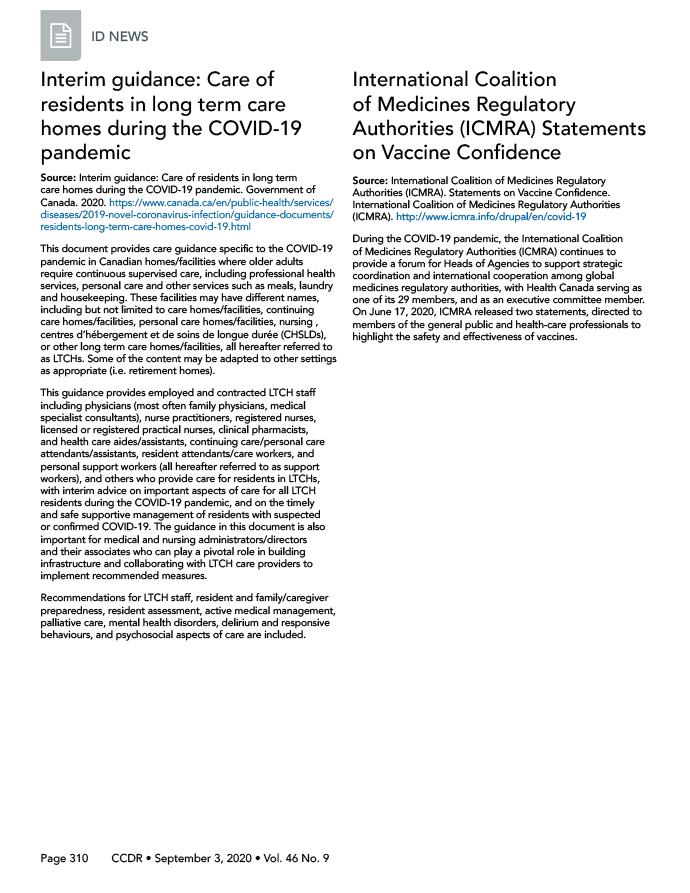COVID-19 and residents in Long Term Care Homes; ICMRA Statements on Vaccine Confidence; 2018 Annual surveillance report on West Nile virus and other mosquito-borne diseases

 Download this article as a PDF
Download this article as a PDFPublished by: The Public Health Agency of Canada
Issue: Volume 46–9: Force Health Protection
Date published: September 3, 2020
ISSN: 1481-8531
Submit a manuscript
About CCDR
Browse
Volume 46–9, September 3, 2020: Force Health Protection
ID News
Interim guidance: Care of residents in long term care homes during the COVID-19 pandemic
Source: Interim guidance: Care of residents in long term care homes during the COVID-19 pandemic. Government of Canada. 2020.
This document provides care guidance specific to the COVID-19 pandemic in Canadian homes/facilities where older adults require continuous supervised care, including professional health services, personal care and other services such as meals, laundry and housekeeping. These facilities may have different names, including but not limited to care homes/facilities, continuing care homes/facilities, personal care homes/facilities, nursing homes/facilities, centres d’hébergement et de soins de longue durée (CHSLDs), or other long term care homes/facilities, all hereafter referred to as long term care homes (LTCHs). Some of the content may be adapted to other settings as appropriate (i.e. retirement homes).
This guidance provides employed and contracted LTCH staff including physicians (most often family physicians, medical specialist consultants), nurse practitioners, registered nurses, licensed or registered practical nurses, clinical pharmacists, and health care aides/assistants, continuing care/personal care attendants/assistants, resident attendants/care workers, and personal support workers (all hereafter referred to as support workers), and others who provide care for residents in LTCHs, with interim advice on important aspects of care for all LTCH residents during the COVID-19 pandemic, and on the timely and safe supportive management of residents with suspected or confirmed COVID-19. The guidance in this document is also important for medical and nursing administrators/directors and their associates who can play a pivotal role in building infrastructure and collaborating with LTCH care providers to implement recommended measures.
Recommendations for LTCH staff, resident and family/caregiver preparedness, resident assessment, active medical management, palliative care, mental health disorders, delirium and responsive behaviours, and psychosocial aspects of care are included.
International Coalition of Medicines Regulatory Authorities (ICMRA) Statements on Vaccine Confidence
Source: International Coalition of Medicines Regulatory Authorities (ICMRA). Statements on Vaccine Confidence. International Coalition of Medicines Regulatory Authorities (ICMRA).
During the COVID-19 pandemic, the International Coalition of Medicines Regulatory Authorities (ICMRA) continues to provide a forum for Heads of Agencies to support strategic coordination and international cooperation among global medicines regulatory authorities, with Health Canada serving as one of its 29 members, and as an executive committee member. On June 17, 2020, ICMRA released two statements, directed to members of the general public and health-care professionals to highlight the safety and effectiveness of vaccines.
West Nile virus and other mosquito-borne diseases surveillance report – Annual edition (2018)
Source: West Nile virus and other mosquito-borne diseases surveillance report – Annual edition (2018). Public Health Agency of Canada. Government of Canada. 2020.
Mosquito-borne diseases in Canada – Zoonotic diseases are infectious diseases caused by bacteria, viruses and parasites that spread between animals and humans. West Nile virus (WNV) continues to be the leading cause of domestically acquired mosquito-borne disease in Canada. West Nile virus circulates between avian hosts and competent mosquito vectors. Mosquitoes may then infect a broad-range of dead-end hosts (i.e. not able to transmit the disease further) including humans, horses, other mammals, and amphibians. As a result, surveillance efforts of mosquito-borne diseases require a One Health approach that recognizes the health of humans is interconnected to animals and the environment. In addition to describing the human health burden of WNV, this report will demonstrate the efforts made to strengthen animal health surveillance in collaboration with multi-disciplinary health partners with the goal of achieving optimal human health outcomes.
For more information:
To access the 2018 West Nile Virus and Other Mosquito-borne Diseases Surveillance Report (https://www.canada.ca/en/public-health/services/publications/diseases-conditions/west-nile-virus-other-mosquito-borne-diseases-surveillance-annual-report-2018.html)
To access 2020 weekly West Nile Virus and Other Mosquito-borne Disease Surveillance Report (https://www.canada.ca/en/public-health/services/diseases/west-nile-virus/surveillance-west-nile-virus/west-nile-virus-weekly-surveillance-monitoring.html)
